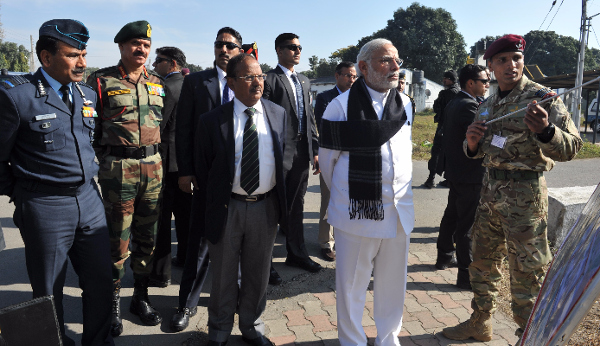New Delhi: India has a game plan ready with a multi-pronged approach to deal with Jammu and Kashmir post the landmark decision to revoke Article 370 on August 5.
Diplomatically, economically and militarily, India has prepared that plan aimed at bringing normalcy in the valley while trying to win global support for its position on Kashmir.
The Geneva-based UN Human Rights Council, will hold its 42nd Session between September 9 and September 22. Pakistan is expected to repeat its claims of human rights violations in Kashmir against the backdrop of the government’s decision but India is ready with its counter-attack plans.
Sources in the government said that Indian officials will be forceful and pointed in demolishing the Pakistani bogey on Kashmir.
India has prepared details highlighting Pakistan’s poor record in Balochistan and North Waziristan that has rendered many Pakistani refugees within its own country. These will be listed at the Human Rights Council meet to discredit Pakistani attempts to draw attention to Kashmir.
Overlapping with the 42nd session of the UN Human Rights Council will be the UN General Assembly meeting in New York between September 17 and 27, where New Delhi is expected to clash once again with Islamabad over Kashmir.
India has its diplomatic manoeuvres ready to isolate and discredit Pakistan that has been trying its best to internationalise the Kashmir issue, but with little success.
Pakistan Prime Minister Imran Khan is expected to raise the Kashmir issue during his address to the UNGA. He is scheduled to embark on a four-day visit to the US on September 23.
But India plans to present a strong case armed with international backing of at least three permanent members of the UN Security Council nations that the abrogation of Article 370 is an internal matter of India and the Kashmir issue is a bilateral issue.
The latest endorsement came from Russia when, with President Vladimir Putin by his side, Prime Minister Narendra Modi told media persons that neither Russia nor India appreciated outside interference in its internal matters.
France and the UK subscribe to the principle of territorial sovereignty outlined in the Treaty of Westphalia and they are unlikely to back Pakistan on the question of Jammu and Kashmir in the context of India’s territorial integrity.
Plans are also afoot to thwart any street protests by Pakistan-backed organisations outside the venue of UNGA.
The diplomatic offensive will continue in October during the plenary and working group meetings of the Financial Action Task Force (FATF) in Paris — the inter-governmental body will meet from October 13 to 18.
Sources said there is little doubt that Pakistan will be blackballed at the meeting.
Pakistan has already felt a body blow in August in Canberra when the FATF Asia-Pacific Group put it in its “enhanced blacklist” category over terror financing and money laundering. The Asia Pacific Group (APG) of the Financial Action Task Force (FATF) had found that Pakistan was non-compliant on 32 of the 40 compliance parameters of terror financing and money laundering.
Around this time, the government’s economic plans for bringing normalcy in the Kashmir Valley will kick in. This will be between September and October when the orchards are full and apple and apricot farmers in Kashmir are busy trying to sell their produce at the best price. This year, the yield is expected to be high.
Notwithstanding that, top sources within the government have told the news agency IANS that the government will ensure the entire crop is bought out at a record price, something that Kashmir’s fruit trade has not seen in recent times.
The sources said that the prices offered for the produce would be an improvement of what the trade had been offered in the last three years. This will not only increase economic prosperity in the Valley but will help them move on psychologically after August 5, the government hopes.
By this time, the autumn will be over and the Valley’s high reaches will start witnessing snow. Within no time, the entire Valley will be snowcapped. Apart from terrorists sneaking in from the Pakistan side, no major turmoil is expected.
This is when the military plans to kick-in with the BSF on patrol at the border and the Indian Army, Central Reserve Police Force and Kashmir Police taking over to deal with odd encounters.
The winter is expected to last till at least February. By then, the immediate shock value for the normal ‘awaam’ of Kashmir will be over.
Immediately after the abrogation of Article 370, National Security Advisor Ajit Doval stayed in the valley for weeks monitoring its immediate aftermath, while Army Chief Bipin Rawat recently visited the newly created Union Territory.
Meticulous planning is being done by select ministers, top officials, intelligence officers and others in North and South Block.
Source: SIFY
Image Courtesy: WSJ
You may also like
-
IAF Aircraft Set Course For Exercise Eastern Bridge VII At Oman
-
India-us Working Together In Areas Like Critical Minerals, Supply Chains And Advanced Technologies: Shri Piyush Goyal
-
Defence Secretary to co-chair 5th India-Philippines Joint Defence Cooperation Committee meeting in Manila
-
2nd India-Japan Finance Dialogue held in Tokyo on 6th September, 2024
-
Prime Minister, Shri Narendra Modi welcomes Crown Prince of Abu Dhabi
